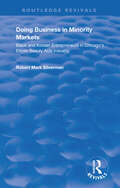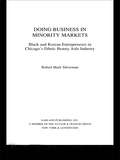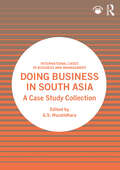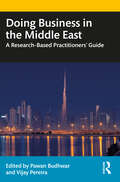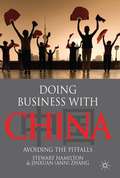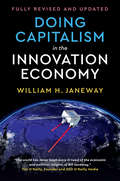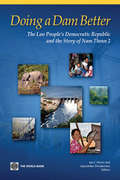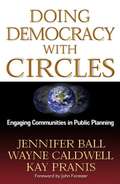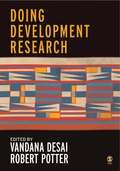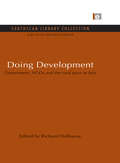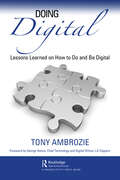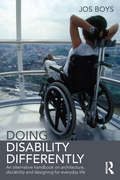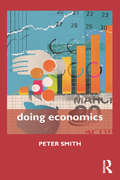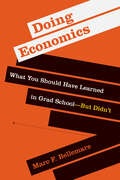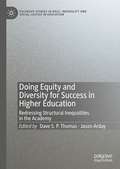- Table View
- List View
Doing Business in Minority Markets: Black and Korean Entrepreneurs in Chicago's Ethnic Beauty Aids Industry (Garland Studies In Entrepreneurship Ser.)
by Robert Mark SilvermanFirst Published in 2000. The invisible hand of the market cannot conceal color. This study contends that the economy is an extension of society’s system of racial and ethnic stratification. The central argument of this study is that the internal colonial paradigm should be used as a guiding principle in the analysis of minority business development in minority markets. Through the use of this paradigm, the institutional constraints of doing business in a minority market can be identified. The ethnic beauty aids industry was selected as the subject of this case study because it is embedded in the context of minority markets, which entail high concentrations of minority entrepreneurs and consumers. Minority entrepreneurs enter minority markets to avoid racial barriers they perceive in the mainstream economy, and minority consumers find minority markets more accessible and responsive to their consumption needs.
Doing Business in Minority Markets: Black and Korean Entrepreneurs in Chicago's Ethnic Beauty Aids Industry (Garland Studies in Entrepreneurship)
by Robert Mark SilvermanFirst Published in 2000. Routledge is an imprint of Taylor & Francis, an informa company.
Doing Business in South Asia: A Case Study Collection (International Cases in Business and Management)
by G. V. MuralidharaThis concise textbook comprises selected case studies on the strategic challenges and opportunities faced by real-world organizations operating in South Asia. The collection includes 15 short case studies from across the region, allowing easy comprehension and class discussion, and covers strategic management, localization strategies, strategic challenges, emerging global brands, digital transformation, sustainability, inclusive business, and economic development. Each case has corresponding reflective questions, references, and further reading and activities, making this a perfect comprehensive guide to help students understand and apply concepts to real-world situations. Providing a solid understanding of the South Asian business environment, this is ideal recommended reading for advanced undergraduate and postgraduate students studying South Asian and International Business, Strategic Management, Emerging Markets, and Global Entrepreneurship. Online, instructors will find complementary teaching notes to support learning.
Doing Business in the Middle East: A Research-Based Practitioners’ Guide
by Pawan Budhwar Vijay PereiraThe Middle East has for a long time been at the centre of global trade as well as political interest. Demographic and social change shifts in global economic power, rapid urbanisation, climate change and resource scarcity, and significant technological development make this region both complex and hugely important. Doing Business in the Middle East highlights both the opportunities and constraints confronting foreign investors in the region and proposes strategies on how best to overcome them. The book explores the existing and emerging political and legal frameworks, sociocultural patterns, national infrastructures, regulatory environment, conflict resolution and how to negotiate in the Middle East. It also provides useful insights into how to approach advertising and marketing, promotion and distribution, and also at the strategies for investing in the region and appropriate modes of entry. With a number of features such as case studies, examples of effective and ineffective practices, clear takeaways, and a note on a future agenda on each given topic, this book is highly practical. Based on robust research, this comprehensive guide to doing business in the Middle East is an ideal reference tool for potential foreign investors, those who are already doing business or intend to do so in the region, and for a range of business and policy decision-makers. The book is also suitable for students and researchers in the fields of international management and business, international and strategic HRM, cross-cultural management, and business communication.
Doing Business in the Middle East: A cultural and practical guide for all business professionals
by Donna MarshThis new and updated book is necessary reading for all professionals working in the Middle East and North Africa, it includes: - The practical impact of Islam on business- Safety and security in the region- Business etiquette- Political and social do's and don'ts The practicalities of doing business in the MEA region are covered in detail, from the initial visit to establishing productive working relationships, including opening an office in the region. It also focuses on issues of particular importance to all businesswomen, and for men who might be working with Arab and Muslim women.
Doing Business in the Middle East: A cultural and practical guide for all business professionals (Inspector Carlyle Ser.)
by Donna MarshThis book is necessary reading for all professionals working in the Middle East and North Africa, it includes: the practical impact of Islam on business; safety and security in the region; business etiquette; political and social do's and don'ts and the practicalities of doing business - from the initial visit to establishing productive working relationships, including opening an office in the region. It also focuses on issues of particular importance to all businesswomen, and for men who might be working with Arab and Muslim women.
Doing Business with China
by Stewart Hamilton Jinxuan Ann ZhangThis book is about understanding the differences and risks, ownership, culture and management practices when investing, managing or working with Chinese companies. It explores the progression of overseas listing of Chinese companies and the reasons behind theattitude shifts towards overseas Chinese stocks.
Doing Business with the Nazis: Britain's Economic and Financial Relations with Germany 1931-39
by Neil ForbesBritain's financial and economic relations with Nazi Germany are assessed in this book. The structure and formulation of British policy, the interaction of government and business and the relationship between British business interests and Nazi germany are looked at. A particular focus of the book is on the crisis of uncertainty felt in Britain over the rejection of economic internationalism. Sterlings devaluation and the imposition of tariffs opened up a breach with Europe which exerted a severely destabilising influence. In the face of economic nationalism at home and agroad, leading figures in British commercial and political life struggled to prevent a complete breakdown of relations with Germany - the most important trading partner in Europe.
Doing Capitalism in the Innovation Economy
by William H. JanewayThe innovation economy begins with discovery and culminates in speculation. Over some 250 years, economic growth has been driven by successive processes of trial and error: upstream exercises in research and invention and downstream experiments in exploiting the new economic space opened by innovation. Drawing on his professional experiences, William H. Janeway provides an accessible pathway for readers to appreciate the dynamics of the innovation economy. He combines personal reflections from a career spanning forty years in venture capital, with the development of an original theory of the role of asset bubbles in financing technological innovation and of the role of the state in playing an enabling role in the innovation process. Today, with the state frozen as an economic actor and access to the public equity markets only open to a minority, the innovation economy is stalled; learning the lessons from this book will contribute to its renewal.
Doing Capitalism in the Innovation Economy: Reconfiguring the Three-Player Game between Markets, Speculators and the State
by William H. JanewayLegendary economist Hyman Minsky identified author William H. Janeway as a 'theorist-practitioner' of financial economics; this book is an expression of that double life. Interweaving his unique professional perspective with political and financial history, Janeway narrates the dynamics of the innovation economy from the standpoint of a seasoned practitioner of venture capital, operating on the frontier where innovative technology transforms the market economy. In this fully revised and updated edition, Janeway explains how state investment in national goals enables the innovation process and why financial bubbles accelerate and amplify its impact. Now, the digital revolution, sponsored by the state and funded by speculation, has matured to attack the authority, and even the legitimacy, of governments. The populist response in the west, especially in the United States, opens the door for China to seize leadership of the innovation economy from America.
Doing Corporate Business in Russia: From Civil Theory to Practice
by Anna S. Vlasova Natalia M. UdalovaThe right to do business in Russia is granted by the Constitution of the Russian Federation, which states that everyone shall have the right to freely use his or her abilities and property for entrepreneurial or any other economic activity not prohibited by the law. In the Russian Civil Code, business activity is understood as an independent activity, performed at one’s own risk, aimed at systematically deriving profit from the use of the property, the sale of commodities, the performance of work, or the rendering of services by the persons registered in this capacity in conformity with the law-established procedure. Doing Corporate Business in Russia attempts to examine not only the theoretical aspects of Russian business procedures, but also the specific nature of their implementation. This book offers an examination of the process of establishing, functioning, and terminating various types of business corporations in the Russian Federation and gives readers a thorough understanding of business in Russia. It clarifies the legal features of management and interaction with contractors and public authorities. It also touches upon the issues of legal linguistics and its role in legal practice. Knowledge in this field enables the reader to get a sense of the correct interpretation of the content of legal documents, proper definitions of terms, and of the potential violations of the rights of business entities based on improper understanding of normative language. The book will be useful to scientists and practicing lawyers, students, and anyone interested in the specifics of corporate business entities and the Russian business climate.
Doing Critical Management Research (SAGE series in Management Research)
by Mats Alvesson Dr Stanley A. Deetz`Alvesson and Deetz rehearse the arguments against neo-positivism and quantitative research very effectively... also make the important distinction between qualitative work in general and critical qualitative work in particular. The arguments here feel fresh and engaged, helped along by numerous illustrations and examples from particular research studies. ...a welcome antidote to the majority of methodology books, especially in a climate where research - especially at doctoral level- is increasingly prone to standardization. The value of the book in this regard cannot be overestimated, because it draws together insights and arguments. ...expect it to be widely read and cited, and to remain the standard text on critical management research practice for a good many years to come. This is an excellent text which combines a very impressive coverage of the literature while showing great care and thought in exposition' - Management Learning Providing a detailed discussion of the practice of doing critical research in organizations, utilizing both qualitative research processes and critical theories of organizations, this textbook will be essential for all those involved in interpreting and researching contemporary institutions and organizations. This volume gives an authoritative and insightful framework for navigating critical theories and methods across the social sciences, but in particular in relation to the study of corporate organizations.
Doing Dams Better: The Challenge of Lao Nam Theun 2
by Jayasankar Shivakumar Ian C. PorterIn the wake of an acrimonious debate on big dams, the World Bank brokered a global agreement on financing as well as on the sharing of the rewards and risks of the controversial Nam Theun 2 hydroelectric project in Lao PDR. Through this process, it prepared the project for the country and the country for the project. This book describes how careful management, effective communications, and technical expertise helped to reach consensus and nurtured private-public partnerships, engaged stakeholders, strengthened the country's development framework and poverty reduction efforts, and addressed the project's environmental and social impacts.
Doing Deals and Leading Teams at XAF Partners
by Boris Groysberg Kerry HermanPrivate equity firm XAF Partners, created out of the 2003 merger of Shanghai-based Xuan Partners and AF Group, a spin out of the Shanghai-based, emerging market-focused private equity arm of a large European bank, had grown steadily over the last decade, establishing offices in Beijing, Hong Kong, Jakarta, Kuala Lumpur, Mumbai, Seoul and Singapore. At the end of their day-long partners' retreat, several firm partners discuss the challenges they face as they juggle three roles in their business life: deal makers in their own sectors; managers of younger associates and directors across their sector teams; and as leaders in their young but successful firm.
Doing Democracy With Circles: Engaging Communities In Public Planning
by Wayne Caldwell Kay Pranis Jennifer BallThe authors have found circles to be very effective for discussing public planning issues, and they draw on their personal experiences in a vivid story of true community participation in dealing with common issues.
Doing Development Research
by Vandana Desai Robert B. PotterDoing Development Research is a comprehensive introduction to research in development studies, that provides thorough training for anyone carrying out research in developing countries. It brings together experts with extensive experience of overseas research, presenting an interdisciplinary guide to the core methodologies. Informed by years of research experience, Doing Development Research draws together many strands of action research and participatory methods, demonstrating their diverse applications and showing how they interrelate. The text provides: · an account of the theoretical approaches that underlie development work · an explanation of the practical issues involved in planning development research · a systematic overview of information and data collecting methods in three sub-sections: · methods of social research and associated forms of analysis · using existing knowledge and records · disseminating findings/research Using clear and uncomplicated language - illustrated with appropriate learning features throughout - the text guides the researcher through the choice of appropriate methods, the implementation of the research, and the communication of the findings to a range of audiences. This is the essential A-Z of development research.
Doing Development: Government, NGOs and the rural poor in Asia (Aid and Development Set)
by Richard HollowayThe absolutely poor, who are mostly rural people, are a large part of the developing world's population and their numbers are growing. Government development programmes, aided by the big donors, have made the poor poorer and have rendered them more powerless in relation to the rest of society. They have done this by sustaining and reinforcing existing exploitative economic, social and political structures. Yet people's movements. religious organizations, voluntary groups, universities and so on have often devised 'alternative' development strategies whose programmes are specifically intended to empower the powerless and selectively enrich the poorest. These groups lack the funds and the political punch to make much more than a dent in the situation. This book brings together some of these workers from the South who describe the problems and provide the answers. They are a challenge to the received 'wisdom' of the North. Originally published in 1989
Doing Digital: Lessons Learned on How to Do and Be Digital
by Tony AmbrozieWe have gone through one of the most disruptive societal changes, on a global scale, over the last three years due to COVID-19. Regardless of the personal and professional impact the pandemic had on us, we’ve all had to adapt to a different reality that continues today. The pandemic has also forced organizations large and small to adjust and rethink their normal business activities – sometimes in abrupt ways – in order to survive a global shutdown. Organizations that did adjust well applied five major principles that they’ll be wise to continue with for the long-term, both when facing extreme events or merely the new normal. First and foremost, successful organizations accelerated digital and the use of digital tools and business models as much as possible. For example, retail operations with modest digital presence suddenly had to sell through digital channels, rather than physical stores. Entertainment content creators had to push everything into streaming services instead of theaters. And healthcare providers moved patient encounters from in-person to telehealth as much as was feasible and safe. This accelerated the digital transformation movement and is the focus of this book. This thought-provoking book offers fundamental principles and a narrative about the entire journey to doing and ultimately being digital, with the view to help the reader build their own mental model on how to approach digital in their situations and organizations. The book also draws a story in which concepts and practices are introduced as needed and is based on the author’s own experiences at American Express and Disney. Presented in five parts, the author introduces the topics of digital, digitization, and digital transformation; discusses the fundamental concepts and building blocks of digital; describes who makes up the ideal digital team; the principles and processes of execution; and puts it all together in the context of the overall business. The author concludes his narrative with a case study from the healthcare industry – an industry that is still 10-15 years behind in their digital transformation. The book concludes with the author’s observations of what AI and ChatGPT means for digital transformations.
Doing Disability Differently: An alternative handbook on architecture, dis/ability and designing for everyday life
by Jos BoysThis ground-breaking book aims to take a new and innovative view on how disability and architecture might be connected. Rather than putting disability at the end of the design process, centred mainly on compliance, it sees disability – and ability – as creative starting points for the whole design process. It asks the intriguing question: can working from dis/ability actually generate an alternative kind of architectural avant-garde? To do this, Doing Disability Differently: explores how thinking about dis/ability opens up to critical and creative investigation our everyday social attitudes and practices about people, objects and space argues that design can help resist and transform underlying and unnoticed inequalities introduces architects to the emerging and important field of disability studies and considers what different kinds of design thinking and doing this can enable asks how designing for everyday life – in all its diversity – can be better embedded within contemporary architecture as a discipline offers examples of what doing disability differently can mean for architectural theory, education and professional practice aims to embed into architectural practice, attitudes and approaches that creatively and constructively refuse to perpetuate body 'norms' or the resulting inequalities in access to, and support from, built space. Ultimately, this book suggests that re-addressing architecture and disability involves nothing less than re-thinking how to design for the everyday occupation of space more generally.
Doing Economics (Doing... Series)
by Peter SmithDoing Economics offers a clear and accessible guide to the nature of Economics. Unlike many other mainstream disciplines, economics is a subject that many students meet for the first time when they arrive at University to study the subject at degree level. The way economics is studied at university level can vary greatly from economics as represented in the media, but this handy beginner’s guide bridges that gap. This book answers such questions as: What is economics as a subject? What sorts of questions does it address? What skills are needed to become a good economist? Where will it take me? Students will be introduced to the key characters who contributed to the development of economics, as well as to the central ideas and concepts. This definitive guide outlines the attributes that make a good economist and presents a wide variety of employment opportunities that can follow the study of economics. Familiarising students with the important terms and issues, it is an essential volume for all students approaching this fascinating subject.
Doing Economics: What You Should Have Learned in Grad School—But Didn’t
by Marc F. BellemareA guide for research economists: how to write papers, give talks, navigate the peer-review process, advise students, and more.Newly minted research economists are equipped with a PhD&’s worth of technical and scientific expertise but often lack some of the practical tools necessary for &“doing economics.&” With this book, economics professor Marc Bellemare breaks down the components of doing research economics and examines each in turn: communicating your research findings in a paper; presenting your findings to other researchers by giving a talk; submitting your paper to a peer-reviewed journal; funding your research program through grants (necessary more often than not for all social scientists); knowing what kind of professional service opportunities to pursue; and advising PhD, master&’s, and undergraduate students. With increasing data availability and decreasing computational costs, economics has taken an empirical turn in recent decades. Academic economics is no longer the domain only of the theoretical; many young economists choose applied fields when the time comes to specialize. Yet there is no manual for surviving and thriving as a professional research economist. Doing Economics fills that gap, offering an essential guide for research economists at any stage of their careers.
Doing Equity and Diversity for Success in Higher Education: Redressing Structural Inequalities in the Academy (Palgrave Studies in Race, Inequality and Social Justice in Education)
by Jason Arday Dave S. P. ThomasThis book provides a forensic and collective examination of pre-existing understandings of structural inequalities in Higher Education Institutions. Going beyond the current understandings of causal factors that promote inequality, the editors and contributors illuminate the dynamic interplay between historical events and discourse and more sophisticate and racialized acts of violence. In doing so, the book crystallises myriad contemporary manifestations of structural racism in higher education. Amidst an upsurge in racialized violence, civil unrest, and barriers to attainment, progression and success for students and staff of colour, doing equity and diversity for success in higher education has become both politically urgent and morally imperative. This book calls for a redistribution of power across intersectional and racial lines as a means of decentering whiteness and redressing structural inequalities in the academy. It is essential reading for scholars of sociology and education, as well as those interested in equality and social justice.
Doing Ethics in Media: Theories and Practical Applications
by Chris Roberts Jay BlackDoing Ethics in Media: Theories and Practical Applications is an accessible, comprehensive introduction to media ethics. Its theoretical framework and grounded discussions engage students to think clearly and systematically about dilemmas in the rapidly changing media environment. The 13-chapter text is organized around six decision-making questions-- the "5Ws and H" of media ethics. The questions encourage students to articulate the issues; apply codes, policies or laws; consider the needs of stakeholders; sift and sort through conflicting values; integrate philosophic principles; and pose a "test of publicity." Specifically, the questions ask: * What's your problem? * Why not follow the rules? * Who wins, who loses? * What's it worth? * Who's whispering in your ear? * How's your decision going to look? As they progress through the text, students are encouraged to resolve dozens of practical applications and increasingly complex case studies relating to journalism, new media, advertising, public relations, and entertainment. Other distinctive features include: * Comprehensive materials on classic moral theory and current issues such as truth telling and deception, values, persuasion and propaganda, privacy, diversity, and loyalty. * A user-friendly approach that challenges students to think for themselves rather than imposing answers on them. * Consistent connections between theories and the decision-making challenges posed in the practical applications and case studies. * A companion website with online resources for students, including additional readings and chapter overviews, as well as instructor materials with a test bank, instructor's manual, sample syllabi and more. www.routledge.com/textbooks/black * A second website with continuously updated examples, case studies, and student writing - www.doingmediaethics.com. Doing Ethics in Media is aimed at undergraduates and graduate students studying media ethics in mass media, journalism, and media studies. It also serves students in rhetoric, popular culture, communication studies, and interdisciplinary social sciences.
